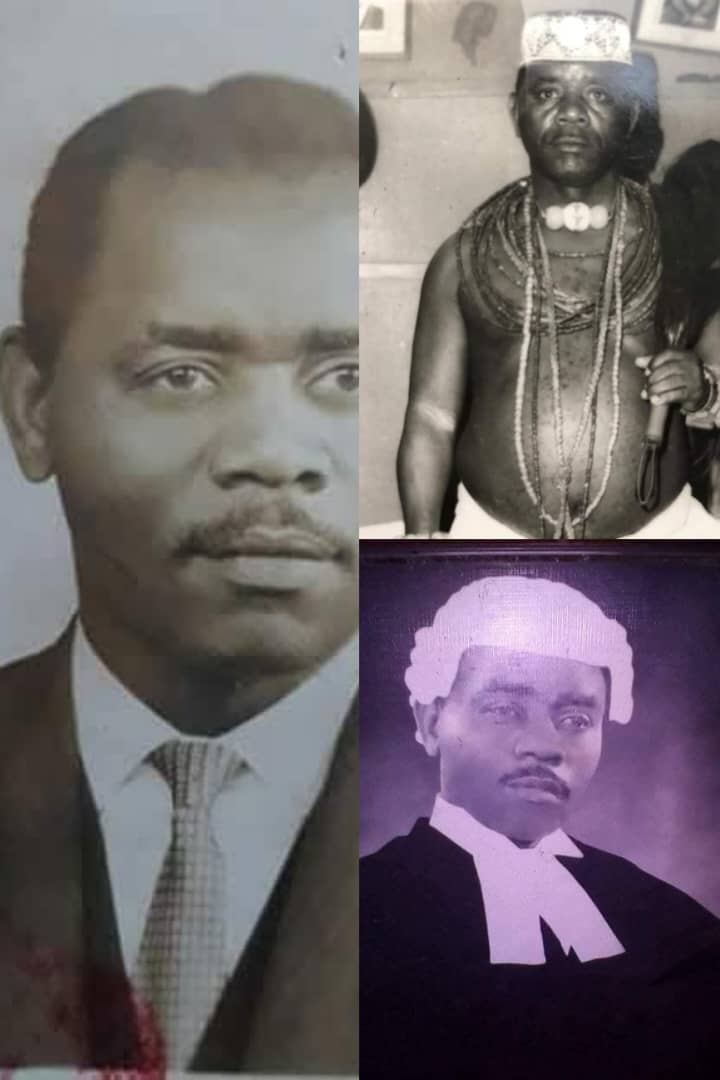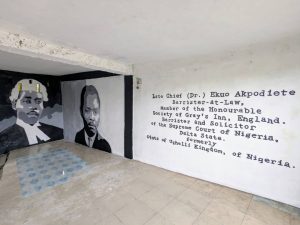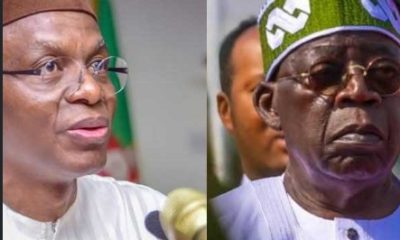Opinion
Fuel Challenge In Nigeria: Modular refineries to the rescue?

By Joshua Ocheja
Nigeria is enmeshed in the imbroglio between the Dangote refinery and the Nigerian National Petroleum Corporation Limited (NNPCL). African countries, however, seem to be tapering towards developing capacities to solve their problems. This entails creating an environment that enables indigenous solutions in critical sectors of the economy.
In 2001, former President Olusegun Obasanjo lifted the lid on the operationalisation of manageable-sized petroleum production when he inaugurated the Presidential Committee on Local Content in the Oil and Gas Industry. This was to promote indigenous participation and ownership in the oil and gas sector. The Nigerian National Petroleum Corporation (NNPC) was mandated to drive the policy and set specific targets for the burgeoning sector.
In 2010, the Nigerian Content Development and Monitoring Board (NCDMB) was established with a mission to “promote the development and utilization of in-country capacities for the industrialization of Nigeria through the effective implementation of the Nigerian Content Act.” It is also tasked to maximize the participation of Nigerians in oil and gas activities. The question is: How this could be achieved?
Enter, the concept of “homestead” modular refineries comes to mind. Modular refineries are not novel. A modular refinery is a simplified refinery requiring significantly less capital investment than traditional full-scale refinery facilities. Nigeria currently has 25 licensed modular refineries.
Five are operational and producing diesel, kerosene, black oil and naphtha. About ten such projects are under various stages of completion, while a handful others have received licenses to establish. At complete optimization, these refineries can process 200,000 barrels of crude daily.
Aradel Refinery in Rivers State was originally “Midas Drilling Fund” when it was first established in 1992, while Excel Exploration and Production Company Ltd in Bayelsa State was incorporated in 2001. Other functional refineries in Nigeria include Waltersmith Petroman Modular Refinery and Petrochemical Company Limited (WRPC) commissioned in November 2020 by former President Muhammadu Buhari; Edo Refinery in Ologbo community abutting Delta State; Duport Refinery also in Edo and Azikel Petroleum Ltd in Bayelsa State.
The modular refinery strategy is hinged on establishing relatively simple-to-operate oil production plants in oil-producing corridors to reduce the nation’s dependence on imported refined petroleum products. It is also a strategy to mitigate product shortages. They serve their immediate catchments to a large extent to reduce often despairing expectations from subsisting centrally distributed sources.
This brilliant thinking corroborates the position of oil and gas sector experts about modular refineries as an alternative to the persistent poor performance of the nation’s big refineries and the near total reliance on importation for all our refined petroleum needs.
With petroleum exploration efforts yielding positive results from parts of the country other than the pre-established oil producing hubs around and about the Niger Delta region, modular refineries may yet become a more diverse concept. For the avoidance of doubt, states like Lagos, Anambra and Kogi have been listed along the existing oil producing states, as beneficiaries of the “13% oil derivation fund.”
Moving forward, this might yet be the magic wand needed to turn things around in Nigeria’s petroleum and gas value chain socioeconomy. Understandably, Nigeria is regularly referenced as a country with elastic capacity to accommodate more modular refineries because it reputedly has the second largest “wetlands” in the world, after the Missisipi in the United States.
Indeed a report published by Hawilti, a Pan-African investment research firm, titled “Refineries watch Q4 2022,” “Modular technology solutions are acknowledged to be on the rise in Africa, and especially in Nigeria. They offer investors the opportunity to cobble together a refinery in a little over a year, from foundation stone laying, to the commencement of actual refining.”
Modular refineries come with ample benefits but require conscientious and sustained support from the government. This has potential to enhance their net contributions to the economy in diverse ways. Among others, they need regular “back patting” to ensure functional efficiency, with the view to enabling them to refine crude oil in line with their installed capacities effectively.
One of the ways this could be achieved is through an increased crude oil supply to the modular refineries and the subsequent payment in naira as against the dollar for crude oil. The results would be tangible. How would this happen? Refining crude oil in modular refineries is more cost-effective.
Modular refineries are mainly situated near the wellhead of oil production, which will require minimal cost. Also, landing costs associated with shipping and other charges would be eliminated. If this doesn’t make sense, what else would? This is my case for modular refineries. We can’t continue to do the same thing and expect different results.
The government must rethink the strategy of modular refineries in Nigeria to support its growth and the attendant benefits accrued to the country. If that doesn’t happen, then the mission of the Nigerian Content Monitoring and Development Board of “promoting the development and utilization of in-country capacities for the industrialization of Nigeria through the effective implementation of the Nigerian Content Act.” would remain a mirage.
The state must think strategically in this regard. The potentials inherent in a functional modular refinery regime cannot be overemphasized. This much was corroborated in an editorial by Businessday newspaper, where it stated that modular refineries have the potential to grow into massive refining clusters and envisages a situation where at least 10 per cent of Nigeria’s oil production should be refined through modular refineries, with the overarching objective to provide a lower-cost, steady supply of fuels and products on a local level.
This is sublime and the way to go in our quest for sustainable growth and development. Industry experts have identified modular refineries as a viable alternative to the current refining template in Nigeria. This is because they provide excellent economic prospects and are more cost-effective. Modular Refineries have various benefits.
Typically, environments contiguous to production areas experience some heightened activities in the local economy. The risk-fraught practice of hauling petroleum products over long distances which often result in accidents and attendant carnages, will be minimised. Dwellers in the remote locations where the refineries are built will be able to access products more readily at controlled rates. Because the pipeline network of refineries is local, the nuisance of oil pipeline vandalism will be checked.
Being a very large market, Nigeria can sustain the smaller modular refineries side-by-side with the big players in the industry, including the federal government-owned processors. It is indeed instructive that conversations about the need to encourage modular refinery petroleum processing is coming at a time when government is readying its own facilities in Port Harcourt, Warri and Kaduna for production. Most traditions in Africa have their variants of the Yoruba adage which exhorts that “you wash your hands better when you deploy both together.” Elsewhere, there is also the saying that “you cannot clap your hands with one hand.”
More incentives should be intentionally availed the modular concept by way of growth and development of regular and increased supply of crude oil, as well as for payments for crude oil supplies to be made in local currency, among others. Modular refineries might just be the magic wand we need to rejuvenate our economy.
Joshua Ocheja, a military historian is a doctorate student at the University of Abuja
Opinion
5G,IoT and AI to boost global GDP by 2030

By Sonny Aragba-Akpore
With Mobile technologies and services now generating around 5.8% of global Gross Domestic Product (GDP) a contribution that amounts to about $6.5 trillion of economic value, there are strong projections that by 2030, this figure will rise to almost $11 trillion, or 8.4% of GDP.
Global System of Mobile Communications Association (GSMA) says much of this will be driven by countries around the world increasingly benefiting from the improvements in productivity and efficiency brought about by the increased take-up of mobile services and digital technologies, including 5G, Internet of Things (IoT) and Artificial Intelligence (AI).
The GSMA recently introduced the 5G Connectivity Index to provide insights into 5G performance in 39 markets in order to encourage informed decision-making.
In terms of Economic Impact,
the GSMA emphasizes the economic benefits of mobile technologies and services, including 5G, projecting that they will contribute significantly to GDP growth by 2030.
“The GSMA provides specific reports and analyses on 5G in different regions, such as Sub-Saharan Africa, Asia ,Middle East among others highlighting the progress and challenges of 5G deployment in specific areas.”
In Sub Saharan Africa for instance with particular attention on Nigeria,South Africa,Egypt,Kenya and Botswana among others some measure of progress in deployment has been recorded.
The rollout of 5G has brought immense benefits across multiple industry sectors, particularly those involving internet of things (IoT) and artificial intelligence (AI) applications in which the real-time transfer of data is crucial.
More broadly, the adoption of 5G is expected to accompany increased data use across the globe, with forecasts anticipating mobile data traffic of over 300 exabytes per month by 2030, more than twice the volume consumed in 2024 according to Statista.
And with a third of global population expected to be covered by this fifth generation (5G) networks ,a technology that has defined new ways of communication by 2025 ,GSMA
says the technology has surpassed growth projections of all times.
“5G subscriptions increased by 163 million during the third quarter 2024 to total 2.1 billion. 5G subscriptions reached close to 2.3 billion by the end of 2024 accounting for more than 25 percent of all global mobile subscriptions.
“4G subscriptions continue to decline as subscribers migrate to 5G” according to GSMA.
As of the first quarter of 2024, there were nearly two billion 5G connections worldwide, with 185 million new additions. This is expected to grow to 7.7 billion by 2028.”
Statistics show that 5G is the fastest-growing mobile broadband technology, reaching 1.5 billion connections by the end of 2023.
It only took four years to reach this number, compared to 10 years for 3G and more than five years for 4G.
“5G is more than a new generation of technologies; it denotes a new era in which connectivity will become increasingly fluid and flexible.5G Networks will adapt to applications and performance will be tailored precisely to the needs of the user” GSMA submits.
By covering one-third of the world’s population , impact on the mobile industry and its customers will be profound according to GSMA.
To deepen the spread of 5G ,GSMA is working closely with the mobile operators pioneering 5G, “by engaging with governments, vertical industries including automotive, financial services, healthcare providers, transport operators, utilities and other industry sectors to develop business cases for 5G.”
And In order to accelerate the growth and spread, many operators are said to be deploying
AI technology as part of an integral part of telecoms operators’ strategic and operational plans.
“Operators are making important advancements in the deployment of AI technology, which is serving as a transformative force shaping the telecoms industry. By deploying autonomous AI-based systems, operators can enhance operational efficiency, customer satisfaction and security, while also creating new revenue opportunities”.
China, South Korea, the United Kingdom, Germany, and the United States are the leading countries with robust 5G coverage in the world.
Since the first commercial launches of the fifth generation of mobile networks in late 2018, these five countries have emerged as leaders because multiple companies in these countries have deployed networks and are selling compatible devices. Countries including Switzerland and Finland are up and comers in 5G development, though they have limited deployment.
In China there are three Companies leading in deployment.
The world’s largest 5G network was launched by the three largest Chinese network operators Oct 31, 2019, according to the state-run news agency Xinhua. These are China Mobile, China Unicom, and China Telecom which all activated their networks in less than five months after they were issued 5G licenses.
Each of the network operators offered their 5G services at $18 per month in 50 Chinese cities at the beginning of the launch.
GSMA expects 36% of China’s mobile users to be using 5G by 2025. That’s about 600 million subscribers, who would also make up 40% of the entire global 5G market by this year.
This is all despite efforts made by the United States government to hamper the progress of Chinese vendors, though those efforts may affect how Chinese companies may expand into the global market.
In South Korea,SK Telecom and Korea Telecom run as the main competitors for the South Korean 5G market.
SK Telecom acquired spectrum in the 3.5 GHz and 28 GHz frequencies to prepare for deploying 5G.
In April of 2019, the Enterprise claimed to be the first mobile carrier in the world to launch 5G services to work on 5G smartphones. SK Telecom asserted an edge over rival Verizon, as the former launched 5G services available at the same time as Samsung Galaxy S10 5G smartphone launched in South Korea. Verizon launched mobile 5G services in the U.S. before a 5G enabled smartphone was available to U.S. consumers.
SK Telecom also conducted tests with a 5G Standalone (SA) Core (a core not reliant on the 4G network) for their 5G network in cooperation with Samsung Electronics.
The world’s largest 5G network was launched by the three largest Chinese network operators Oct 31, 2019, according to the state-run news agency Xinhua. These are China Mobile, China Unicom, and China Telecom which all activated their networks in less than five months after they were issued 5G licenses. Each of the network operators offered their 5G services at $18 per month in 50 Chinese cities at the beginning of the launch.
“What we are seeing is a concerted effort by the Chinese — the operators, vendors, and government regulators — to deploy 5G as quickly as possible,” Chris Nicoll, principal analyst at ACG Research, pointed this out in a November 1, 2019 SDxCentral article.
With all of these players working together, the three network operators had collectively deployed nearly 86,000 5G base stations peaked over 130,000 by the end of 2019. The latter number breaks down into China Unicom and China telecom, with each planning to install 40,000 base stations, and the market leader China Mobile to install 50,000.This was the projection by 2019 but they have since overshot this by the beginning of 2024.
The International Telecommunication Union (ITU), says 5G coverage reached 40% of the world’s population in 2023 with an uneven coverage and distribution with developed countries having more coverage than low-income countries:
In Europe ,68% of the population is covered and
Americas had 59% of the population covered while
Asia-Pacific has 42% of the population covered as at 2023.
Arab States have 12% of the population covered.
Commonwealth Independent of States (CIS) had 8% of the population covered.
ITU figures show Africa,s coverage rose to 10 % of the population by 2023 .
The ITU also notes that 90% of the world’s population is covered by 4G, but 55% of people without access to 4G live in low-income countries because In low-income countries, 3G is often the only technology available to connect to the Internet.
The ITU develops and adopts international regulations and global standards to enable the harmonization and implementation of broadband mobile networks.
In Africa, around a dozen nations have launched services including Botswana, Kenya, Mauritius, Madagascar, Nigeria, Seychelles, South Africa, Tanzania, Togo, Zimbabwe, and Zambia but Africa is a patchwork of 54 countries.
And penetration is predicted to be slow.
By 2027, Ericsson predicts that 80 percent of phone users in Europe will have 5G service.
At the same time, 5G subscriptions in Africa, home to 1.4 billion people, May stagnate at a little over 10 percent. Why will so few people in Africa get access to 5G services?
China, South Korea, the United Kingdom, Germany, and the United States remain the leading countries with robust 5G coverage in the world.
While many countries are already providing robust services,Africa remains on the outskirts of 5G services.
The countries in Africa that have launched 5G networks, include South Africa with its roll out
In March 2022, when the Independent Communications Authority of South Africa (ICASA) sold spectrum across several bands.
In Nigeria,MTN rolled out commercial 5G services in Lagos in 2022, with other roll out in Abuja, Port Harcourt, Ibadan, Kano, Owerri, and Maiduguri among others.
MTN Congo announced that it was the first country in Central Africa to deploy 5G.
In Botswana Orange deployed 5G technology to provide new services in the Gaborone and Francistown regions.
Other countries in Africa that have launched 5G Fixed Wireless Access (FWA) services include: Angola, Kenya, Zambia, and Zimbabwe.
Analysts say “5G’s potential is growing due to its ability to deliver fiber-like speeds. However, there are still challenges in the region, such as:
Urban areas are reaching their maximum capacity whereas a large portion of the population lives in rural areas.
This explains why 5G adoption in the sub-Saharan region is currently below six percent “
Analysts report that 5G deployment in Africa faces many challenges, including Spectrum assignment,regulatory issues,infrastructure,security,financial resources among others.
“Spectrum is a limited resource that is already in use by other services, such as TV broadcasters and satellite operators. Governments need to open up frequencies and grant 5G licenses at reasonable prices. “
Infrastructure is another major challenge.
“5G networks require a large initial investment, including expensive devices, antennas, and Radio Access Network (RAN) hardware. The infrastructure needs to be fiberized to support 5G services.
Regulatory conditions also serve as challenges to deployment.
For instance “regulatory authorities may not have started the process for licensing and granting frequencies in the right portion “
“Most of the equipment and devices required for 5G deployment need to be imported.”
There are also security challenges that make
5G technology vulnerable to cyber security threats, such as tracking calls and exposing user locations.
Opinion
Right of Reply: THE PUNCH AND BUSYBODY BUSINESS

The recent declaration of a State of Emergency in Rivers State has triggered diverse commentaries from a wide range of Nigerians.
Almost everyone hailed the presidential proclamation because of the visible threat to law and order in the state at the time the action was taken. Of course, there were a few naysayers who read political meanings into an otherwise sincere and prompt intervention.
One such negative interpretation is the position taken by the Editorial Board of The Punch newspaper. In one of its editorials published on the matter, the national daily claimed that the entire crisis was caused by what it described as “the needless meddlesomeness in the governance of the state by its former governor and Tinubu’s Federal Capital Territory Minister, Nyesom Wike….” It is unfortunate that this narrative and others like it have become commonplace in the media space.
How did the Editorial Board of a reputable newspaper arrive at such a conclusion? Their claim that the Sole Administrator, Admiral Ibok Ete Ibas (rtd), has been acting a script purportedly written by the Minister of the Federal Capital Territory, Nyesom Wike, is also faulty and has no iota of truth.
They also faulted the sacking of all political appointees who served in Governor Siminalayi Fubara’s administration, insinuating that their replacements were drawn from Wike’s political camp. Again, nothing can be further from the truth.
Since his appointment as the Sole Administrator of Rivers State, Admiral Ibok Ete Ibas has been running the state with the abundant human resources available in the state and has not imported anybody from outside the state. Did the Editors of The Punch really expect him to run the administration with the politicians loyal to the suspended governor?
Do they not know that the crop of political appointees who served Fubara would have found it difficult to work with the Sole Administrator?
Certainly, they know the truth, but they have chosen to stoke the fire to generate more tensions in Rivers State.
Certain interests might have commissioned this editorial to cast aspersions on the Sole Administrator and raise doubts about his capacity to run the state.
It may also have been the handiwork of Wike’s political detractors, the man whom many politicians love to hate for no other reason than envy and jealousy.
We urge the Punch newspapers to seek a better mode of intervention in the political situation and not dwell on innuendos and unsubstantiated allegations against certain political actors in order to blackmail them.
Dr Ike Odogwu
Opinion
“Chief. Dr. Ekuogbe Akpodiete; A Philanthropist, Lawyer, and Statesman”


In a life of achievement, Chief Ekuogbe Akpodiete popularly called the Duke by his contemporaries in the UK was an assessment clerk, post office clerk, a court interpreter, an educationist, a business man, a political party chieftain, a Barrister and Solicitor, a Magistrate, the Otota (the Prime Minister) of Ughelli kingdom which is the highest traditional chieftaincy office that underpin the royal office of the Ovie of Ughelli Kingdom.
He was a trail blazer, a strict disciplinarian, a lover of people, and a philantropist. He saw to it that people lived in peace and happiness.
Born on the 4th of April, 1924, to parents cut from an industrious mould, Chief Ekuogbe Rowland Gregory Akpodiete took zealously to education that neither his mother Ughweriaka who was a trader, nor his father Akpodiete who was a farmer had.
He attended the Native Authority Primary School, Ughelli, and Enitona High School, Port Harcourt, for his secondary school education.
He thereafter had a brief teaching career in primary schools in Ofuoma near Ughelli, he worked as a process clerk in the then Sapele Township Department between 1950 and 1953, serving at the same time as an interpreter in the local courts.
He proceeded to the United Kingdom to seek the proverbial Golden Fleece where he worked and paid his way through, studying Law. He was admitted into the Honourable society of Gray’s Inn, England, in 1965, and shortly after, he returned home to Nigeria and attended the Nigerian Law School. He was called to the Nigerian Bar in 1966. He immediately started practice in Lagos. However, his practice in Lagos was regrettably abridged by the Nigerian Civil War, which drove him to his hometown Ughelli in 1967, where he continued to practise among his kith and kin as the first Legal Practitioner.
Chief Ekuogbe Akpodiete established himself in Ughelli. After the civil war, he served in the now defunct Mid-western State Judiciary from 1972 to 1975 as a Magistrate.
He was conferred with the chieftaincy title of Urhukperovie of Ughelli kingdom (the light of the King) by the then reigning Ovie of Ughelli, His Royal Highness Oharisi II of blessed memory in 1977.
In the quest for more knowledge, he went back to England for his Master’s degree in law (LL.M) and later a Ph.D. at the University of Warwick.
He was awarded an honourary doctorate degree (Ph.D) by Tenesse Christian University from the United States of America in 1991.
He became the Otota (the Prime Minister) of Ughelli Kingdom in 1986, an office he occupied until his demise on 9th April 1995.
Chief Ekuogbe Akpodiete was also politically involved. In the heady days of the Awolowo-led Unity Party of Nigeria, he was the party’s legal adviser in Ughelli and was on hand to assist during Chief Obafemi Awolowo’s campaign hosting in Ughelli and its environs.
In view of his love for people and entertainment, he established a popular cinema house, one of the first in Ughelli, known as REGA cinema, coined from his names, alongside an entertainment place called Unutakunu (people talk to people).
Chief Ekuogbe Akpodiete was blessed with wives and many children, grandchildren, and great grand children.
Mr. Olotu Akpodiete, PhD
Executive Director
Olotu & Ekuogbe Rowland Akpodiete foundation
-

 News5 hours ago
News5 hours agoBREAKING: Unknown gunmen reportedly storm Senator Natasha’s family residence
-

 News14 hours ago
News14 hours ago“How my father escaped assassination” – Bishop Oyedepo’s daughter
-

 News8 hours ago
News8 hours agoSnub story on removal of Rivers Sole Administrator, it’s FAKE-Chief Registrar
-

 News14 hours ago
News14 hours agoFG expresses sympathy for CBEX victims, urges a united effort to combat Ponzi schemes
-

 News7 hours ago
News7 hours agoSAD! Again, Alleged Herdsmen Attack Three Benue Communities
-

 News20 hours ago
News20 hours agoEl-Rufai labels Tinubu’s government ‘worst in Nigeria’s history’
-

 News14 hours ago
News14 hours agoWoman tragically lost her life after attempting to flee through glass door during alleged incident of domestic violence
-

 Politics7 hours ago
Politics7 hours agoPDP govs are jokers, can’t stop coalition train, Atiku boasts






